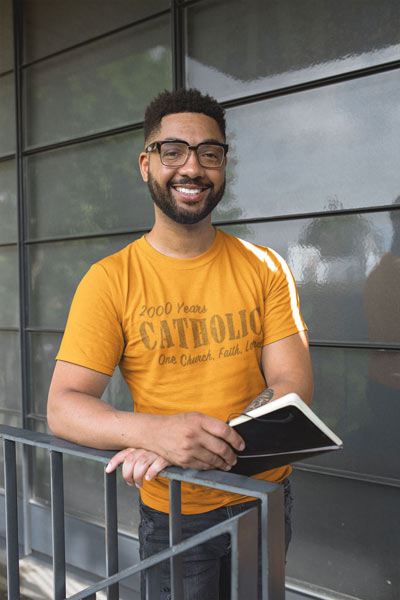As Catholics recite the daytime prayer midmorning antiphon in the Liturgy of the Hours, “The time of penance has come, the time to atone for our sins and seek our salvation.” The Lenten call which beckons our return to the Lord is voiced from the lips of the faithful within the Catholic Church.
By Deacon Frederick Bartels
17 March 2010
Lent is a season which invites Catholics and other Christians around the world to kneel before the base of the Cross, meditate upon the sins we have committed which caused our Savior’s suffering, and enter into a period of profound conversion and change. For this reason, Lent is a time of atonement and penance, a period in which we acknowledge our sinfulness, turn away from our past life toward a life with Christ, and embrace the call to holiness. In order to fully enter into such a call, fervent repentance is necessary.
However, in what is often a materialist culture whose secular doctrine persistently encourages the practice of overindulgence in pleasures, entertainment and worldly comforts, the true meaning of repentance is often distorted, watered-down or altogether lost.
Further, atonement for one’s sins and penance—which are integral and necessary aspects of repentance—are often deemed “unnecessary and burdensome practices of the past” in which only the “unenlightened” participate. Perhaps such an attitude is due, in part, to the fact that these penitential practices involve a measure of voluntary suffering—which is something quite unwelcome in our contemporary world. Thus it is rather easy to give in to the temptation which tells us there is no merit in these sacrificial acts of repentance. But what does it mean to truly repent?
The Greek word for repentance that is used in the Gospel is metanoia, which literally means “to change one’s mind.” This change of mind necessarily entails a profound interior conversion in which we firmly turn from worldly darkness, and embrace a new way of life as Christ’s disciples. Thus repentance is not merely to know of Christ, nor is it a matter of picking and choosing—with an intellectual arrogance—some aspects of our Lord’s teaching while coldly rejecting others; rather, it is a union of mind, heart and soul to the Person of Christ. To repent is to die to Christ, discarding our former way of life in favor of the Way, Truth, and Life that is Christ himself.
In the Old Testament, the prophets continually called the People Israel to repentance in order that the barriers of sin might be removed, allowing God’s blessings to flow forth. The prophets exhorted Israel to real, heartfelt interior conversion whereby one’s whole being would again be focused on God’s will. “Cast away from you all the crimes you have committed, and make for yourselves a new heart and a new spirit” (Ez. 18:31). The Lord contrasts repentance or the lack of it with life and death: “For I have no pleasure in the death of anyone who dies, says the Lord God. Return and live!” (18:32).
Read more about repentance, reconciliation and penance.
In the New Testament, when John the Baptist began preaching in the desert of Judea, he immediately and with urgency went about exclaiming: “Repent, for the kingdom of heaven is at hand!” (Mt. 3:2). In accordance with the prophets who came before him, John reminds us that true repentance will be evidenced by increased virtue: “Produce good fruit as evidence of your repentance” (3:9); and, as a warning against those who would ignore the call to conversion, John proclaimed: “Even now the ax lies at the root of the trees” (3:10).
After Jesus’ temptation in the desert he “returned to Galilee in the power of the Spirit” (Lk. 4:14), and from that time on “began to preach and say, ‘Repent, for the kingdom of heaven is at hand.’” (Mt. 4:17). Our Lord warns us of the serious need for complete, life-changing repentance: “Enter through the narrow gate; for the gate is wide and the road broad that leads to destruction, and those who enter by it are many. For the gate is narrow and the way is hard that leads to life, and those who find it are few“ (Matthew 7:13 -14).
St. Maximus the Confessor wrote, “God’s will is to save us, and nothing pleases him more than our coming back to him with true repentance.” Christ gave of himself in an indescribably radical way upon the Cross in order that we might begin to understand the depths of God’s love for us, turn back to him with our whole heart, and accept the salvation he offers. Our Lord has unquestionably demonstrated his love. Yet there is a question of love that remains for each of us: “Do I love Christ with my whole being?” Do I radically love God as he radically loves me?
Love must be proven out in action. St. Theresa of Avila wrote, “Christ does not force our will, He takes only what we give Him. But He does not give Himself entirely until He sees we give ourselves entirely to Him.” To repent is to give ourselves entirely to the Lord; it is to return from those dark paths we have walked for so many years, setting off on a journey toward a new horizon, one which glows with eternal Light.
Return to me with your whole heart, with fasting, and weeping, and mourning; rend your hearts, not your garments, and return to the Lord, your God.
Joel 2:12
Learn more about fasting and abstinence.
When we return to God with our whole heart, we weep and mourn; for we see with stark clarity those numerous times—those times of sin—when we failed to love God. The rending of our heart drives us toward a desire to do penance; for we see our lowliness in the divine light of fervent conversion, which clearly reveals all our attachment to sin.
St. Jerome lived an ascetic and holy life, a life of deep interior conversion in which his understanding of the reality of sin was illuminated in the divine light of the Holy Spirit. As a result, he made this somewhat disturbing comment regarding the general judgment at Christ’s second coming: “Whether I eat or drink, or whatever else I do, the dreadful trumpet of the last day seems always sounding in my ears: ‘Arise, ye dead, and come to judgment!’”
Yet the most profound call to repentance is experienced as we go before the Cross this Lenten season, as we kneel there along with our Blessed Mother, as we gaze upon our loving Savior who gave entirely of himself for love of us—even though we are sinners. See our Redeemer there, crucified at the Place of the Skull; battered, bloodied and dying; the weight of his body harshly pulling on those terrible, cold spikes driven through his innocent, sacred flesh. Though the pain was excruciating, Jesus received no consolation from the crowd who surrounded him; rather, they shouted and mocked: “He saved others; he cannot save himself. So he is the king of Israel!” (Mt. 27:42). Do we also refuse our Lord consolation by withholding from him a truly repentant and loving heart?
Before repentance is possible, we must journey to the well of prayer, and seek life-giving water. We must humble ourselves before our All-Holy and gracious Creator who has loved us even before we were conceived in our mother’s womb. Let us seek to know the gift of God.
“If you knew the gift of God!” The wonder of prayer is revealed beside the well where we come seeking water: there, Christ comes to meet every human being. It is he who first seeks us and asks us for a drink. Jesus thirsts; his asking arises from the depths of God’s desire for us. Whether we realize it or not, prayer is the encounter of God’s thirst with ours. God thirsts that we may thirst for him.
CCC No. 2560
What does our loving Savior say to us in the midst of his immense Passion, fastened in a cruelest way to the wood of the Cross? “I thirst” (Jn. 19:28). It might seem Christ is speaking of physical thirst only. However, from his divine and human lips, he utters a profound statement of unfathomable dimension far beyond the physical. Our Lord thirsts for us. The meaning of the Cross is God’s incomprehensible thirst for love. Filled with an unexplainable and radical love for you and me, Jesus Christ thirsts for our repentance, conversion and prayer; he thirsts for our soul.
Christ’s peace.

Deacon Frederick Bartels is a member of the Catholic clergy who serves the Church in the diocese of Pueblo. He holds an MA in Theology and Educational Ministry, and is a Catholic educator, public speaker, and evangelist who strives to infuse culture with the saving principles of the gospel. For more, visit YouTube, iTunes and Twitter.






its really good and faith strengthning. i am happy for the commentary and hard work done for the faithful.